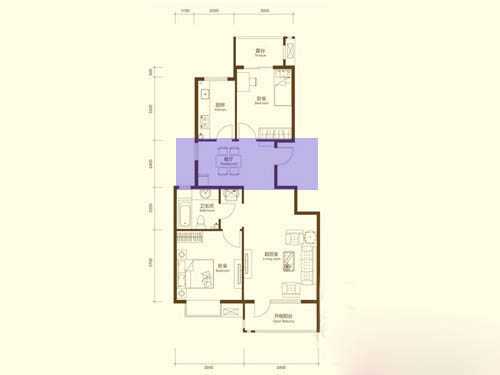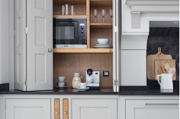In the context of traditional Chinese architecture and Feng Shui, the concept of "穿堂" (xiān tang) refers to the flow of air through the front and back of a building, passing through the windows and doors. This principle is deeply rooted in the belief that the movement of air plays a crucial role in the overall harmony and balance of a living space. Understanding and harmonizing the "穿堂" airflow is essential for creating an environment that promotes well-being, prosperity, and harmony.
The Concept of "穿堂" in Feng Shui

The term "穿堂" literally translates to "air passing through," and it is a fundamental concept in Feng Shui. In essence, it refers to the natural movement of air through the front and back of a building, passing through the windows and doors. This airflow is influenced by the placement of doors and windows, as well as the overall layout of the space. The goal of "穿堂" Feng Shui is to ensure that the air flows oothly and evenly, creating a balanced and harmonious environment.
The Importance of Air Flow in Living Spaces
Air flow is a critical factor in creating a comfortable and healthy living environment. Proper air circulation helps regulate body temperature, improves air quality, and promotes mental clarity and well-being. In Feng Shui, the "穿堂" airflow is seen as a key factor in achieving these benefits. By optimizing the flow of air through the front and back of a building, individuals can create a space that is not only aesthetically pleasing but also conducive to living harmony.
The Role of Windows and Doors in "穿堂" Feng Shui
Windows and doors are the primary channels through which air flows in and out of a building. In "穿堂" Feng Shui, the placement and size of these openings play a significant role in determining the overall airflow. Properly sized and strategically placed windows and doors can enhance the flow of air, while poorly designed openings can create blockages or disrupt the natural movement of air.
For example, in a room with a large window, the airflow can be directed towards other areas of the building, creating a sense of connection and balance. Conversely, a poorly sized window or door can create a restriction in the airflow, leading to a feeling of stagnation or imbalance.
The Influence of "穿堂" Airflow on Health and Well-being
The "穿堂" airflow has a direct impact on the health and well-being of individuals living in a space. Proper air circulation can help regulate body temperature, improve air quality, and enhance mental clarity. Additionally, balanced airflow can help prevent the accumulation of negative energies, such as negativity or煞气 (xì), which can disrupt the flow of energy and create an imbalance in the environment.
In Feng Shui, the "穿堂" airflow is often associated with the concept of "气场" (qì chéng), or the flow of energy, which is believed to influence the overall harmony and balance of a space. By optimizing the airflow through windows and doors, individuals can create a living environment that is not only aesthetically pleasing but also conducive to well-being.
The Application of "穿堂" Feng Shui in Different Rooms
The principles of "穿堂" Feng Shui can be applied to different rooms in a building, depending on their purpose and function. For example, in the bedroom, the airflow should be directed towards the door, creating a sense of connection between the room and the outside. This can help promote rest and rejuvenation, as well as improve sleep quality.
In the living room, the airflow should be directed towards the back of the room, creating a sense of balance and harmony. This can help enhance the overall energy of the space and create a welcoming environment for guests. In the kitchen, the airflow should be directed towards the back of the room, as this is where the energy of the kitchen is most concentrated.
Tips for Optimizing "穿堂" Airflow
Optimizing the "穿堂" airflow in a space requires careful consideration of the placement and size of windows and doors, as well as the overall layout of the space. Here are some tips for achieving balanced airflow:
-
Size and Placement of Windows and Doors: Ensure that windows and doors are appropriately sized to allow for ooth airflow. Place larger windows and doors towards the front and back of a building, respectively, to enhance the flow of air.
-
Layout of the Space: Arrange furniture and other objects in a way that promotes airflow. Avoid placing large objects or furniture in front of windows or doors, as this can block the flow of air.
-
Use of Decorative Elements: Incorporate decorative elements, such as mirrors or plants, that can enhance the flow of air. For example, placing a mirror in front of a window can reflect light and enhance the sense of openness in a space.
-
Natural Airflow: Make use of natural airflow by opening windows and doors during the day and closing them at night. This can help regulate the temperature and humidity of the space, as well as enhance the overall airflow.
The Role of "穿堂" Feng Shui in Harmonizing Spaces
The principles of "穿堂" Feng Shui play a crucial role in harmonizing spaces and creating a balanced and harmonious environment. By optimizing the airflow through windows and doors, individuals can create a space that is not only aesthetically pleasing but also conducive to well-being. Whether it is the bedroom, living room, or kitchen, the "穿堂" airflow can help enhance the overall harmony and balance of the space.
In conclusion, "穿堂" Feng Shui is a powerful tool for creating a living environment that is not only beautiful but also conducive to well-being. By understanding and harmonizing the airflow through windows and doors, individuals can create a space that promotes rest, rejuvenation, and overall harmony. Whether it is the bedroom, living room, or kitchen, the principles of "穿堂" Feng Shui can help enhance the overall balance and harmony of the space.
相关阅读:
灵显禅寺求签在哪里?guide to finding the incense burnings at Xingxián Chessiland
解读牌照的吉凶,解读 Motor Vehicle Inspection License Meaning and Implications
Can You Read People’s Fortune Tellings?A Guide to Understanding and Using Divination Methods
2021年3月黄历吉时,选择 auspicious moments for success and harmony
二号黄历吉时,选择 auspicious moments for success and harmony
2024年农历3月初九吉时,auspicious moments for prosperity and harmony
23吉时,选择 auspicious moments for prosperity and harmony
Twelve Zodiac Signs and Their Corresponding Flowers
True Mountain True Signings:A Timeless Legend of Balance and Harmony
初二auspicious timing,2024年的auspicious moments for students and families








